Alcohol brands are reacting to consumer demand for better ethics with (mostly) favourable results. What are the positives and pitfalls of a higher sense of purpose?
Ethics is big business in the booze category nowadays. At one time, brands lured shoppers purely with sleek designs, disruptive flavours and ingredients or – let’s be honest – deep discounts and promotional offers. Nowadays, many have evolved their approach to deliver a higher sense of purpose.
They’re tackling food waste, backing LGBTQ+ rights, donating profits to community projects and even championing animal conservation. And though in many cases it’s challenger brands and startups that are best known for fighting the good fight – the likes of Brewgooder, Elephant Gin, winemaker Sea Change and Crumbs Brewing – giants like Diageo, Molson Coors and Anheuser-Busch InBev are all highly engaged in ESG activity.
In the past 12 months, we’ve seen Absolut Vodka champion LGBTQ+ voices, Carlsberg roll out bio-based, recyclable bottles made from wood pulp, and Halewood (among others) pull out of Russia in a stance against the conflict in Ukraine.
So, how important is ethics now in getting cut-through on the UK’s busy booze shelves? What type of ethical behaviour matters most to shoppers? And what are the challenges and risks of trying to do the right thing?
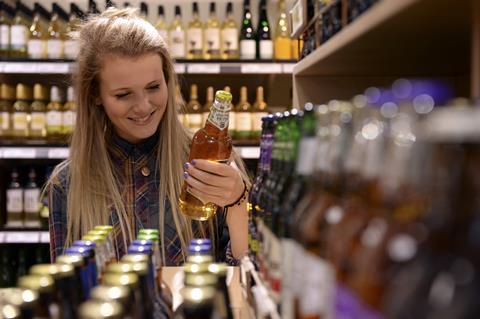
Alcohol is playing ethical catch-up
Better known for providing “happiness and hedonism” than facilitating conscious consumerism, alcohol is behind other more essential grocery categories when it comes to prioritising ethics and sustainability, says Tom Stockley, business development manager at Collective Spirits.
But it’s catching up quickly. “We’ve seen a real explosion in manufacturers sharing how they’re ethically and sustainably focused,” Stockley adds. “There’s a real appetite to learn more, to understand more, and create a better offering for more discerning consumers.”
Not least as the most discerning consumers – those that fall into Gen Z and millennial demographics – are now largely of drinking age. And they aren’t messing around when it comes to their scrutiny of brand behaviour.
“People are quite tuned in to cases where your brand’s track record of operations does not match up to a campaign designed to highlight your ethics”
Miika Lipiäinen, co-founder of the Kyrö Distillery Company
In fact, 40% of gen Zers say they’d happily boycott a brand that fails to deliver on the promises it makes, according to research by Ipsos. Driven by the priorities of these two youngest generations, ethics has undoubtedly moved up the priority list for alcohol brands, says James Hughes, co-founder & chief brand officer at Brewgooder, a craft beer maker that supports clean water projects.
“To put their purchasing influence into perspective, within the beer industry specifically these two consumer groups will be responsible for the majority of global beer consumption by 2030.
![drinks_RGB[48]](https://dmrqkbkq8el9i.cloudfront.net/Pictures/480xAny/2/9/4/297294_drinks_rgb48_667484_crop.jpg)
“So, there’s a demographic shift that’s already happened and we will see it play out across all categories, including alcohol, over the next seven years,” Hughes believes.
Even outside these core consumer groups, the ways in which shoppers select brands from the booze category has fundamentally changed, points out Andrew Stevenson, co-founder of design agency Tangent, which is working with scotch whisky brand Eden Mill on developing one of the world’s first climate-positive distilleries. Rather than making selections based purely on price or taste, “a person’s choice can often be a strong reflection of who they are, what they like, and what they value”, he says.
“Selection means something now [and so] your choice of beer or spirit brand is not dissimilar to your fashion choices and what they say about you.
“Added to that, we live in a social media culture and share so much more than ever before, so again every consumer decision is potentially seen by more people – perception has become a much bigger part of the proposition for drinks brands to consider.”
Read more:
-
Britain’s Biggest Alcohol Brands 2023: The top 100
-
The year’s biggest risers and fallers
-
The drinks challenging the top 100
Ethical resonance
Ethics and sustainability are broad terms, of course, and it can be tricky for brands to pin down exactly what type of purposeful brand positioning will resonate most.
After all, some shoppers will prioritise environment, some ethical supply chains, and others will have high expectations for the brands they buy to speak out proactively on high-profile social issues.
It’s no doubt why there’s been a huge variety of initiatives in the past 12 months alone, from tackling food waste and eliminating single-use plastic to supporting animal conservation and backing human rights, with a single brand often spearheading more than one. At Gloucester Brewery, for example, the team announced its plans to broaden community engagement in May with the aim to raise £50,000 for Gloucestershire-based causes, facilitating and hosting fundraising evenings. It’s also supported efforts to help those struggling with addiction and pledged to go net zero. “The key [themes] I see are inclusivity, diversity, environment and sustainability,” says its MD, Geoff Smith.
“While we are not a certified B Corp company, the ethics, values and behaviours we exhibit are very similar and one of the key attractions for many of our customers.”
![drinks_RGB[48]](https://dmrqkbkq8el9i.cloudfront.net/Pictures/480xAny/2/9/3/297293_drinks_rgb48_667484_crop.jpg)
Nigel White, CEO of The Marketing Place, adds that qualities such as “environmental leadership, inclusivity and fairness in a number of aspects right back up the supply chain, working conditions, pay rates, executive remuneration” are all areas where consumers are looking for brands to step up.
“Timing or recognising the zeitgeist is important, too,” he says, with those brands able to spot areas of rising discontent and take quick action to respond accordingly putting themselves ahead of the curve.
That may even necessitate a long, hard look in the mirror, argues Miika Lipiäinen, co-founder of the Kyrö Distillery Company. “Environmental and traditional sustainability practices are no longer enough,” he says.
“Alcohol can be dangerous and damaging, especially when combined with social detachment, mental health issues and poverty, and therefore combining robust environmental work with partnerships aimed at helping with these social issues seems to be both effective and to resonate with our customers.”
Crucially, brands taking a proactive stance on ethics or the environment in recent years have often been rewarded with clear commercial benefits. Across the top 100 Britain’s Biggest Alcohol Brands as a whole, the majority (58%) saw value sales decline in the past year, 27% by double digits [NIQ 52 w/e 22 April 2023], as a continuing recovery in on-trade sales together with a tough economic climate saw consumers scale back on more costly items in their shopping baskets.
“Perception has become a much bigger part of the proposition for drinks brands to consider”
Andrew Stevenson, co-founder of design agency Tangent
Many of those with positive value growth in the past year, however, have taken steps to carve out a more purpose-led brand position. These include Diageo-owned Baileys (+5.1%), which in 2022 became the world’s biggest spirits brand to be accredited a B Corp, Thatchers Cider (+7.8%), which has invested millions to achieve its net zero aims alongside initiatives like its Community Orchard Project. Whyte & Mackay (up 8.2% in value) even teamed up with a Scottish marine research organisation in October 2022 in a bid to boost biodiversity.
That said, the link between ethics and a healthy bottom line isn’t always such a straightforward one and, as much as the past year has been littered with brands reaping the rewards of doing the right thing, others have been caught short by underestimating the risks.
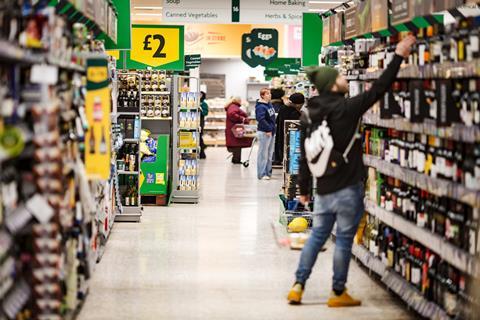
In April, for example, Anheuser-Busch CEO Brandan Whitworth was forced to release a statement following backlash at its decision to partner with social media influencer Dylan Mulvaney, a trans woman, for promotion of its Bud Light brand in the US. Such was the strength of the controversy over the move that some drinkers even shifted their ire from the social sphere to the real one, publicly burning crates of Bud Light and firing bullets at cans.
“We never intended to be part of the discussion that divided people,” insisted Whitworth, before US sales of the brand reportedly fell for six consecutive weeks.
It’s something brands need to be prepared for, warns White. “Algorithms on social media encourage grouping of thinking at the extremes, so increasingly people are either for something or against.
“If any business, or brand or person, is going to take a particularly strong stand on something, then it can be expected that certain groups will want to take the opposite view,” White adds. “The key will be ensuring it’s a deeply held belief that runs right from the top of the company, and isn’t just a ‘jump on the bandwagon’ appeal to a specific audience.”
That’s a lesson that no doubt also rings true for Brewdog. In November, the brewer was heavily criticised for what many saw as a disingenuous campaign calling out Qatar for its human rights abuses ahead of the World Cup – while simultaneously signing a distribution agreement for its beers in the country and battling allegations of creating a ‘culture of fear’ for its own employees.
Then there was the backlash against the promotion offering a number of “sold gold cans” that turned out to be mainly brass. It cost BrewDog an ASA admonishment and £500k reimbursement to unhappy punters, paid out by co-founder James Watts from his personal bank account.
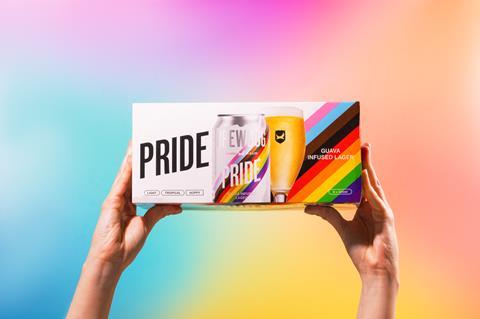
Reputational fallout
The financial impact for BrewDog seems to have been limited to Watts, with both value and volume sales at the Scottish brewer holding level in the last year. But reputationally, the fallout is less clear.
“People are quite tuned in to cases where your brand’s track record of operations does not match up to a campaign designed to highlight your ethics,” says Lipiäinen. “Like a brand, ethics is a construct that lives in the interactions between your organisation and your customers and the world at large. You cannot decide to be ethical, then make a campaign out of it. You’ll get found out.”
Adds Smith: “The most important step we have taken [at Gloucester Brewery] is to genuinely deliver on the ethics that we claim to champion.
“Many organisations may have it written down, and don’t get me wrong there is still more we can do. However, if we say we do it, we actually do it, rather than using it purely for publicity.”
Tempting as it may be, ethics isn’t an easy publicity fix for PR-hungry booze brands, in other words. To reap all the commercial benefits of doing the right thing, brands will have to actually do the right thing – and consistently – or find the backlash is far fiercer than any potential boost to their bottom line.
Britain’s Biggest Alcohol Brands 2023: The top 100

Stella might be maintaining its dominance at the top, but 2023 has proved volatile for booze brands
- 1
- 2
![drinks_RGB[48]](https://dmrqkbkq8el9i.cloudfront.net/Pictures/80x50/2/9/2/297292_drinks_rgb48_667484.jpg) Currently
reading
Currently
reading
The booze brands trying to make the world a better place
- 4








![drinks_RGB[48]](https://www.thegrocer.co.uk/Pictures/80x50/2/9/2/297292_drinks_rgb48_667484.jpg)

![drinks_RGB[48]](https://dmrqkbkq8el9i.cloudfront.net/Pictures/480x270/2/9/2/297292_drinks_rgb48_667484.jpg)



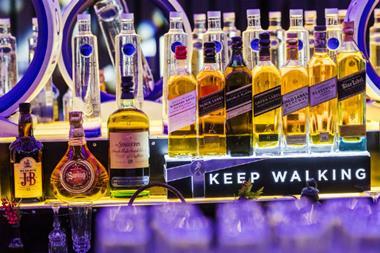
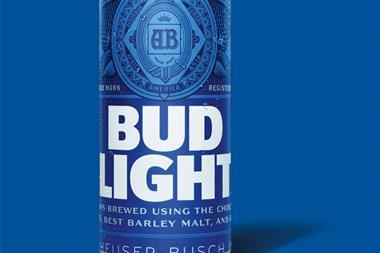




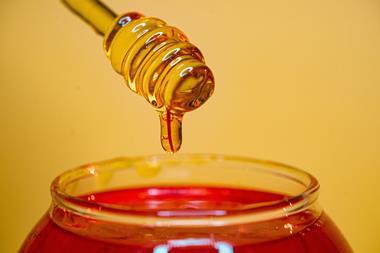
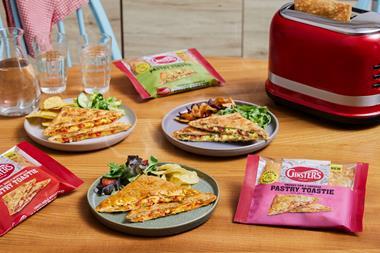
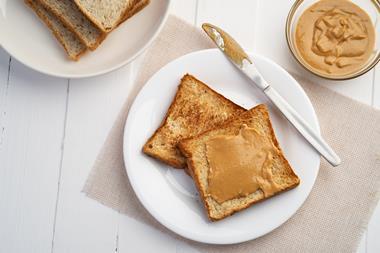
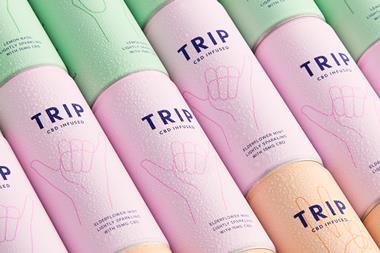
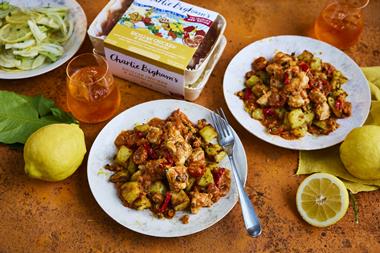
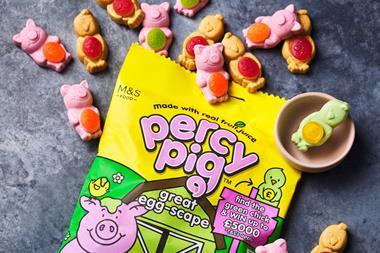
No comments yet